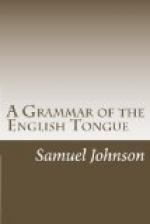Where d or t go before, the additional letter d or t, in this contracted form, coalesce into one letter with the radical d or t: if t were the radical, they coalesce into t; but if d were the radical, then into d or t, as the one or the other letter may be more easily pronounced; as read, led, spread, shed, shred, bid, hid, chid, fed, bled, bred, sped, strid, slid, rid; from the verbs to read, to lead, to spread, to shed, to shread, to bid, to hide, to chide, to feed, to bleed, to breed, to speed, to stride, to slide, to ride. And thus cast, hurt, cost, burst, eat, beat, sweat, sit, quit, smit, writ, bit, hit, met, shot; from the verbs to cast, to hurt, to cost, to burst, to eat, to beat, to sweat, to sit, to quit, to smite, to write, to bite, to hit, to meet, to shoot. And in like manner, lent, sent, rent, girt; from the verbs to lend, to send, to rend, to gird.
The participle preterit or passive is often formed in en instead of ed; as, been, taken, given, slain, known, from the verbs to be, to take, to give, to slay, to know.
Many words have two or more participles, as not only written, bitten, eaten, beaten, hidden, chidden, shotten, chosen, broken; but likewise writ, bit, eat, beat, hid, chid, shot, chose, broke, are promiscuously used in the participle, from the verbs to write, to bite, to eat, to beat, to hide, to chide, to shoot, to choose, to break, and many such like.
In the same manner, sown, shewn, hewn, mown, loaden, laden, as well as sow’d, show’d, hew’d, mow’d, loaded, laded, from the verbs to sow, to show, to hew, to mow, to load, to lade.
Concerning these double participles it is difficult to give any rule; but he shall seldom err who remembers, that when a verb has a participle distinct from its preterit, as write, wrote, written, that distinct participle is more proper and elegant, as The book is written, is better than The book is wrote. Wrote however may be used in poetry; at least, if we allow any authority to poets, who, in the exultation of genius, think themselves perhaps entitled to trample on grammarians.
There are other anomalies in the preterit.
1. Win, spin, begin, swim, strike, stick, sing, sting, fling, ring, wring, spring, swing, drink, sink, shrink, stink, come, run, find, bind, grind, wind, both in the preterit imperfect and participle passive, give won, spun, begun, swum, struck, stuck, sung, stung, flung, rung, wrung, sprung, swung, drunk, sunk, shrunk, stunk, come, run, found, bound, ground, wound. And most of them are also formed in the preterit by a, as began, sang, rang, sprang, drank, came, ran, and some others; but most of these are now obsolete. Some in the participle passive likewise take en, as stricken, strucken, drunken, bounden.
2. Fight, teach, reach, seek, beseech, catch, buy, bring, think, work, make fought, taught, raught, sought, besought, caught, bought, brought, thought, wrought.
But a great many of these retain likewise the regular form, as teached, reached, beseeched, catched, worked.




